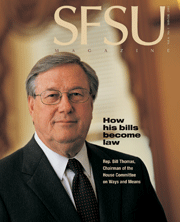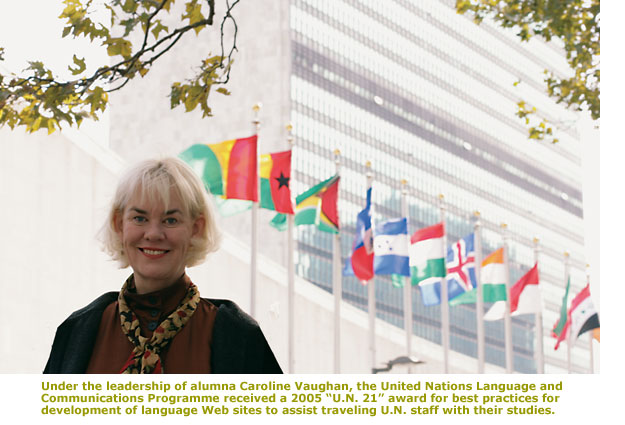 |
| |||
Found in Translation It's ironic that Caroline Vaughan (M.A.,'78) remembers herself as a shy student. A linguist who converses comfortably with diplomats and traverses super-charged venues within the United Nations, Vaughan was once nervous about standing in front of a room full of students at SFSU. Since earning her master's in Teaching English as a Second Language (TESOL), she has come -- and gone -- a long way. Vaughan has traveled the globe, taught in war zones and Eastern European regimes -- and picked up French and Swedish, as well as some Arabic and Serbo-Croatian. The languages come in handy; Vaughan works with a team of 50 teachers and several assistants to run the United Nations Language and Communications Programme at U.N. Headquarters in New York City. The largest in-house training program at the United Nations, Vaughan's area offers classes in English, Arabic, French, Russian, Spanish and Chinese to help staff members and diplomats from 191 member states improve their language skills. Vaughan credits the TESOL program for helping her hone her teaching skills. "While we were studying, we were also teaching in the American Language Institute, so we were trying out all of the things we were learning," Vaughan says. "San Francisco State provided a wonderful introduction to teaching." After graduating from SFSU, Vaughan received Fulbright scholarships to teach English in Poznan, Poland, and Novi Sad, Yugoslavia (Vojvodina). Although her classroom in Tito-era Yugosalvia was subject to strict censorship, Vaughan encouraged her students to practice their English by discussing topics that had previously been off limits. "They just leapt on it," Vaughan says. "They wanted to talk about alternative religions. Immediately the head of the department was in my classroom, and [our talks were] completely censored." Her students took to visiting her apartment to hold their discussions instead. In the early 1980s, Vaughan took a job that most teachers at the time would not consider -- conducting class in the midst of a civil war. At the American University of Beirut, Lebanon, she and her students were undeterred one morning by a shell that left a hole in the classroom. "We just brushed off our desks and had class," she recalls. However, the situation grew increasingly dangerous for Americans. "People would panic overnight," Vaughan says, recalling how friends and colleagues left quickly without goodbyes. In 1985 Vaughan moved to New York City, where she worked at the U.N. as a language instructor while she earned her second master's and a doctorate in applied linguistics at Columbia University. Today she oversees the hiring of all U.N. Headquarters language instructors -- and continues to deal with a unique set of challenges. In a single day, she may change class schedules to accommodate an extraordinary session of the General Assembly, choose content for a course on Internet etiquette, incorporate Council of Europe codes of practice into course objectives and finalize the details on a teachers' book sale to raise funds for developing countries. The current political climate is creating an increasing demand for Vaughan's expertise. Since 2000 there has been 35 percent enrollment increase in language training at the U.N., with Chinese and Arabic leading the trend. | ||||










